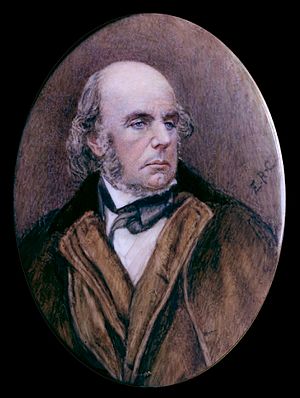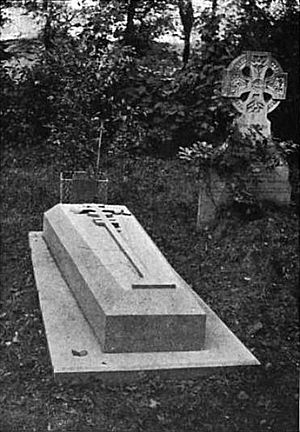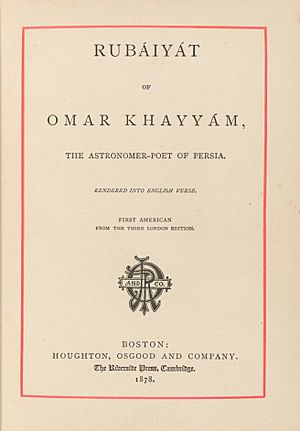Edward FitzGerald (poet) facts for kids
Quick facts for kids
Edward FitzGerald
|
|
|---|---|

Edward FitzGerald by Eva Rivett-Carnac (after a photograph of 1873)
|
|
| Born | 31 March 1809 Bredfield House, Bredfield, Woodbridge, Suffolk, England, UK |
| Died | 14 June 1883 (aged 74) Merton, Norfolk, England, UK |
| Occupation | Poet, writer |
| Notable works | English translation of The Rubaiyat of Omar Khayyam |
| Signature | |
Edward FitzGerald (born Edward Purcell; 31 March 1809 – 14 June 1883) was an English poet and writer. He is most famous for his English translation of The Rubaiyat of Omar Khayyam. This poem has been very popular since the 1860s.
Contents
About Edward FitzGerald's Life
Edward FitzGerald was born in 1809 at Bredfield House in Suffolk, England. His family was very wealthy. In 1818, his father changed the family name from Purcell to FitzGerald. Edward sometimes joked that his family was a bit unusual.
In 1816, his family moved to France, living in places like Paris. But in 1818, they returned to England. Edward went to school at King Edward VI School, Bury St Edmunds and later to Trinity College, Cambridge. There, he became friends with famous writers like William Makepeace Thackeray and Alfred Tennyson.
After college, FitzGerald lived a quiet life in his home county of Suffolk. He enjoyed spending his time with flowers, music, and books. He didn't try to become a famous writer for a long time. In 1851, he published his first book, Euphranor. This was a dialogue based on his memories of Cambridge. He also published Polonius in 1852, which was a collection of wise sayings.
In 1850, FitzGerald began studying Spanish poetry. Later, in 1853, he started learning Persian literature. He married Lucy Barton in 1856, but they separated after only a few months.
His Famous Literary Works
In 1853, FitzGerald translated Six Dramas of Calderon from Spanish. He then focused on studying Eastern cultures and languages. In 1856, he anonymously published a version of Salámán and Absál by Jami.
His most important work began in 1857. His friend, Professor Edward Cowell, found some Persian poems by Omar Khayyám. FitzGerald became very interested in them. On 15 January 1859, he anonymously published his translation called The Rubaiyat of Omar Khayyam. At first, not many people noticed it. Publishers even sold it very cheaply.
However, in 1861, famous artists like Rossetti and Swinburne discovered the Rubaiyat. It slowly became very popular. FitzGerald released a second, much-changed edition in 1868. He also translated other works, including plays by Calderón and the Oedipus tragedies. His last publication was Readings in Crabbe in 1882. He also left behind a translation of Mantic-Uttair by Attar of Nishapur, which he called "A Bird's-Eye view of the Bird Parliament."
From 1861, FitzGerald loved the sea. He bought a yacht called "The Scandal" in 1863. He also became part-owner of a fishing boat. He spent many summers sailing near Lowestoft.
Edward FitzGerald passed away peacefully in his sleep in 1883. He was buried in the churchyard at St Michael's Church in Boulge, Suffolk. His friend, Alfred Tennyson, later honored him in a poem called Tiresias.
Edward FitzGerald's Personal Side
Not much was known about FitzGerald's personal life until his friend, W. Aldis Wright, published his letters. These letters showed that FitzGerald was a witty and kind person who wrote interesting letters. His unique personality became well-known in English literature.
FitzGerald had very close friendships. One of his friends, William Browne, sadly passed away early, which was very difficult for FitzGerald. He also became close to a fisherman named Joseph Fletcher.
FitzGerald was almost a vegetarian. He mostly ate bread and fruit, and only ate meat when he was visiting other people's homes. He once said that tea with bread and butter was his favorite meal.
About The Rubáiyát
FitzGerald published four editions of his translation of the Rubáiyát of Omar Khayyám (Persian: رباعیات عمر خیام) during his lifetime (1859, 1868, 1872, and 1879). A fifth edition was published after he died in 1889. The first, second, and fifth editions are quite different from each other.
Here is a famous stanza from the fifth edition:
A Book of Verses underneath the Bough,
A Jug of Wine, a Loaf of Bread – and Thou
Beside me singing in the Wilderness –
Oh, Wilderness were Paradise enow!
Another well-known stanza from the first edition (1859) is:
'Tis all a Chequer-board of Nights and Days
Where Destiny with Men for Pieces plays:
Hither and thither moves, and mates, and slays,
And one by one back in the Closet lays.
FitzGerald's translation of the Rubáiyát is famous because many writers and artists have used lines or ideas from it in their own works. It was extremely popular for about 100 years after it was published.
The Oxford Dictionary of Quotations includes many stanzas from the poem. Stanza LI is also very famous:
The Moving Finger writes; and, having writ,
Moves on; nor all your Piety nor Wit
Shall lure it back to cancel half a Line,
Nor all your Tears wash out a Word of it.
Many books and plays have titles inspired by the Rubáiyát. For example, Nevil Shute's The Chequer Board and Agatha Christie's The Moving Finger get their names from the poem. The popular song A Cup of Coffee, A Sandwich, and You also echoes lines from the Rubaiyat.
See also
 In Spanish: Edward FitzGerald (poeta) para niños
In Spanish: Edward FitzGerald (poeta) para niños
 | Emma Amos |
 | Edward Mitchell Bannister |
 | Larry D. Alexander |
 | Ernie Barnes |



